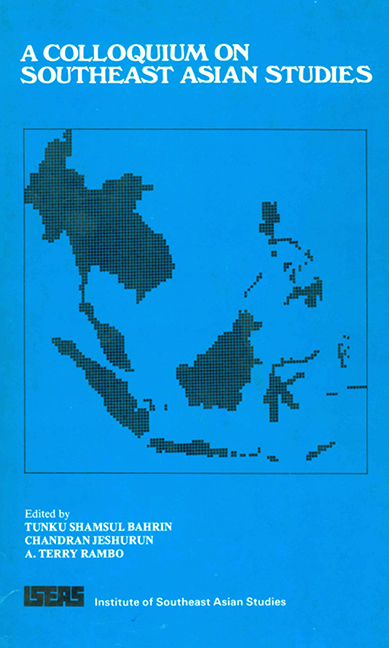Book contents
- Frontmatter
- Contents
- Foreword
- Preface
- Acknowledgements
- Introduction
- Contributors
- PART I TEACHING AND RESEARCH
- PART II ENVIRONMENT AND DEVELOPMENT
- 15 Environment and Development: The Place of Human Ecology in Southeast Asian Studies Programmes
- 16 Environment and Development in Southeast Asia: Trends, Themes and Issues
- 17 Development, Environmental Quality and the Quality of Life in Peninsular Malaysia
- 18 Environment Implications of the Mekong Development Programme
- 19 Development and Environment in Thailand
- 20 Review of Environmental Affairs in Indonesia
- 21 Research and Teaching on Human Ecology in Malaysia
- 22 Human Ecology in the Philippines: Developments in Research, Teaching and Applications
- 23 Environment Education Needs within A Southeast Asian Studies Programme
18 - Environment Implications of the Mekong Development Programme
from PART II - ENVIRONMENT AND DEVELOPMENT
Published online by Cambridge University Press: 21 October 2015
- Frontmatter
- Contents
- Foreword
- Preface
- Acknowledgements
- Introduction
- Contributors
- PART I TEACHING AND RESEARCH
- PART II ENVIRONMENT AND DEVELOPMENT
- 15 Environment and Development: The Place of Human Ecology in Southeast Asian Studies Programmes
- 16 Environment and Development in Southeast Asia: Trends, Themes and Issues
- 17 Development, Environmental Quality and the Quality of Life in Peninsular Malaysia
- 18 Environment Implications of the Mekong Development Programme
- 19 Development and Environment in Thailand
- 20 Review of Environmental Affairs in Indonesia
- 21 Research and Teaching on Human Ecology in Malaysia
- 22 Human Ecology in the Philippines: Developments in Research, Teaching and Applications
- 23 Environment Education Needs within A Southeast Asian Studies Programme
Summary
Introduction
The Committee for Coordination of Investigations of the Lower Mekong Basin (Mekong Committee) was established in 1957 by the Governments of Cambodia (renamed Democratic Kampuchea), Laos (renamed the Lao People's Democratic Republic), Thailand and the Republic of Vietnam (now a part of the Socialist Republic of Vietnam) under the aegis of the Economic and Social Commission for Asia and the Pacific, (ESCAP), of the United Nations. This Committee has embarked on the gigantic and long term task of planning the joint development of the water resources and related resources of the lower Mekong river and its tributaries (the Mekong project), “for the benefit of all the people of the basin, without distinction as to nationality, religion or politics”. The primary means for this development will be a series of dams and associated water control projects to produce hydroelectric power, supply water for irrigation, industry, and public systems, regulate water flow for protection against floods and salinity intrusion, and to improve the navigation and communication network.
The Mekong project is certainly among the most ambitious and comprehensive river basin development efforts ever initiated. It is proposed to develop the water resources in a vast basin drained by the world's sixth largest river, in terms of the 475,000,000m of water discharged annually into the South China Sea. Another salient feature of this project is that it is planned for integrated river development that envisages the use of water for several purposes simultaneously, taking into consideration the entire gamut of economic, social and environmental conditions throughout the basin. A project of this magnitude would necessarily involve large-scale environmental manipulations which will result in extensive changes in the basin's ecosystems. These changes would be inevitably accompanied by significant feedbacks, both positive and negative. The question therefore is: will the contemplated environmental changes, on balance, enhance the vitality and productivity of the Mekong ecoystems and yield sustained, long-term benefits to the people of the basin, or will they disrupt the ecosystems and thus contribute to the deterioration of the environment to a degree where the very goals of the project would be negated?
- Type
- Chapter
- Information
- A Colloquium on Southeast Asian Studies , pp. 233 - 247Publisher: ISEAS–Yusof Ishak InstitutePrint publication year: 1981



